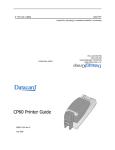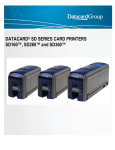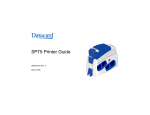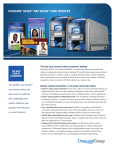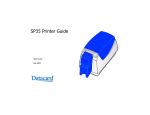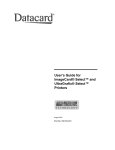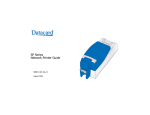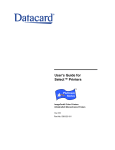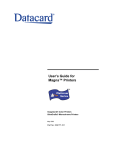Download DataCard CP40 Specifications
Transcript
CP40 Printer Guide 553772-201 Rev. J September 2005 Information resources for the CP40 Card Printer Installation To install the printer: To install one printer to a PC using a USB cable, see the Installation Map, shipped at the top of the printer carton. For detailed installation information or for special situations (such as network installation), see Info Central. Message Help If you see a message, click Help on the message box. Really! Help topics are short and to the point. Printer Guide This Printer Guide contains operating information for the printer and driver. Info Central For in-depth information about using the printer, install Info Central on a Windows PC, then click the icon on the desktop. (Insert the CP Driver CD-ROM and choose User Information to install Info Central.) For help with questions not addressed by other CP Series printer information, contact your dealer. Dealer Customer Care Contact the Datacard® Customer Care Center at 1.800.328.3996 (U.S. & Canada) or 1.952.988.2316 (worldwide).. Contents About the printer . . . . . . . . . . . . . . . . . . . . . . . . . . . 1 Loading cards . . . . . . . . . . . . . . . . . . . . . . . . . . . . . 5 Loading print ribbon. . . . . . . . . . . . . . . . . . . . . . . . . 7 Check the PC connection . . . . . . . . . . . . . . . . . . . . 9 Power on the printer . . . . . . . . . . . . . . . . . . . . . . . 10 Status light. . . . . . . . . . . . . . . . . . . . . . . . . . . . . . . 11 The LCD panel . . . . . . . . . . . . . . . . . . . . . . . . . . . 13 Opening Properties or Printing Preferences . . . . . 15 Open the Printer Toolbox . . . . . . . . . . . . . . . . . . . 17 Cleaning the printer . . . . . . . . . . . . . . . . . . . . . . . . 19 Getting the most out of your printer . . . . . . . . . . . . 21 Printer supplies . . . . . . . . . . . . . . . . . . . . . . . . . . . 23 Troubleshooting. . . . . . . . . . . . . . . . . . . . . . . . . . . 25 Site requirements . . . . . . . . . . . . . . . . . . . . . . . . . 27 Legal Notices (FCC) . . . . . . . . . . . . . . . . . . . . . . . 28 539251-201 Page iii Page 1 About the printer The outside of the printer Printer Cover. Latch: Lift the latch to open the printer cover. Input hopper: Lift the cover to load blank cards. Output hopper: Remove completed cards. Ready button: Push to pause or unpause the printer. The status light helps you understand printer operation. See "Status light" on page 11 for details. Ports are located on the left side of the printer. Manual Advance Knob: Use to release a card in the printer or to turn rollers. Power Receptacle: Plug in the power supply to power on the printer. Cable Guides: Hold the data cable securely. Optional Smart Card USB Port: See “Features and options” on page 4. Optional Smart Card Serial Port: See “Features and options” on page 4. USB Data Port: Connect the data cable to the printer. All printers use this port. Page 2 Page 3 The inside of the printer Cover Arm: Holds the cover and printhead cartridge in place. Printhead Cartridge: Applies the image to the card. Print Ribbon Cartridge (shown with color print ribbon). Printer Label: Includes the serial number and model information (located on the left side of the printer and not visible in this drawing). Cleaning roller (not visible in this drawing): Removes dust and debris from cards. Tip: Lift the latch to open the printer and see inside. 1 1 Features and options Features and options are identified on the printer label. • Printers with “U” printing can print one color (monochrome). Printers with “C” printing can print in full color or monochrome (with specific ribbons). • All CP40 printers use a USB connection. • A magnetic stripe module can be a three-track (IAT) module. The optional magnetic stripe module is visible inside the printer. • An optional smart card module can be one of the following: — Combination smart card reader (SC347) with contact and contactless reader. Visible inside the printer; includes a USB port on the printer. — Contact station (SC400): visible inside the printer; includes a serial port. Page 4 Page 5 Loading cards 1 Open the input hopper cover. 2 Remove cards from the original package. Tips: Handling cards • Cards can stick together: Slide or fan cards to separate the edges. • Do not touch the surface of cards before printing them. (Oils on hands will reduce printing quality.) • Handle cards by the edges or wear gloves. • Orient all cards the same way. 3 Place the cards in the input hopper. The diagram shows the typical locations for the magnetic stripe and smart card chip. 4 Push the input hopper cover closed until it latches. Magnetic stripe Smart card chip See Info Central for current information about cards to use in the printer. . Page 6 Page 7 Loading print ribbon 1 Open the printer cover. 2 Remove the ribbon cartridge. 3 Remove both used ribbon spools from the cartridge (if present). Tips: Handling print ribbon • Keep unused ribbon in the original package. • Don’t place ribbon on a dusty or dirty surface–dirt could damage the printhead. 4 Run a cleaning card and replace the cleaning sleeve at the same time that you load a new print ribbon. See "Cleaning the printer" on page 19 for the steps to follow. 5 Load the new roll of print ribbon on the cartridge. — Put the full spool of ribbon on the supply spindle of the ribbon cartridge. Push until the spool clicks onto the spindle. — Put the empty take-up spool on the spindle with the solid black gear. Push until the spool clicks onto the spindle. 6 Replace the loaded ribbon cartridge in the printer. — Make sure both spindles rest in the black supports on the left side of the printer. — Make sure the ribbon cartridge handle rests in the supports on the right side of the printer. — Make sure to install the full, new spool toward the input hopper of the printer. 7 Close the printer cover. Press down firmly to latch it. Page 8 Page 9 Check the PC connection The printer and PC are connected when the printer is set up. Before beginning card processing, make sure the connection is complete. PC The USB data cable should be connected to a USB port on the PC and to the USB data port on the printer. The printer can be connected in these other ways: • Through a direct network connection, where the printer is connected to a network (using a print server, such as an HP® Jetdirect® 175x) and the PC is connected to the same network. • As a shared printer, where the printer is connected to another PC on the network and the user’s PC is connected to the network. See Info Central for more information about connecting the printer. USB Data Cable Power on the printer Plug in the printer to power it on. The printer does not have a power switch. 1 Make sure the power supply cord connects to the printer power receptacle (1). 2 Connect the power cord to the power supply (2). 3 Connect the power cord to the power outlet (3). 4 The printer powers on and initializes. Tips for printer power • Wait while the printer initializes. • The printer Status Light displays steady green when the printer is ready to print cards. See "Status light" on page 11 for details. • Follow the guidelines for your organization about when to power the printer on and off. Page 10 Page 11 Status light The front of the printer has a light on the LCD panel that provides information about the current state of the printer. See "The LCD panel" on page 13 for more information about the LCD panel. At startup, the status light displays steady amber for several seconds, a red-amber-green sequence, and then blinking green for several seconds. When the printer is ready to print, the status light is steady green. Status Light Description Meaning Red-Amber-Green The printer is starting. The light displays colors while the printer initializes. Steady Green The printer is ready and waiting to print cards. Blinking Green The printer is busy, such as when printing cards or initializing. Steady Amber The printer is paused (without an error) or is initializing. Status Light Description Meaning Blinking Amber The printer has an error. Check the following: • See the PC for a message. • If you used the Power-on/Ready sequence to print a test card, check the printer for problems. • If you changed the printer name, power the PC off and on. Steady Red The printer has a condition that requires service or the printer did not power-on correctly. To attempt to correct the condition, power the printer off and on before calling for service. Off The printer power is off. Page 12 Page 13 The LCD panel The CP40 Card Printer includes an LCD panel. The LCD panel has a 2-line display, four keys, and the Status light. This section describes what you need to know when printing cards. See Info Central for detailed information about viewing and changing LCD settings. The LCD panel provides the following: • Current State (line 1): Shows whether the printer is ready to print, is busy, or is paused. — Press the Ready (undo pause). key to pause or resume the printer • Data format (line 2). • Printer messages: The display shows the message number and a short description of the problem. — Fix the problem and then press the Ready key to clear the message. Repeat if another message is displayed. • Status: Information about the printer, including printer card counts and network settings. To view status details: — Press the Enter key to move to the Main Menu. — Press the Enter key again to enter the Status Menu. — Press the Up Arrow or Down Arrow scroll through the Status Menu choices. key to — Press the Enter key to view the data. — Press the Enter key again to return to the menu. — Scroll to “Exit” and press the Enter key to leave a choice. Repeat as needed to leave the menus. See Info Central for details about viewing and changing settings. Page 14 Page 15 Opening Properties or Printing Preferences Begin with the printer connected to the PC and powered on so values are saved correctly. 1 Choose Start from the Windows task bar. 2 Choose Settings and then Printers (and Faxes). The Printers (and Faxes) window opens. 3 Click once on the CP Driver printer icon to select it. — The driver must be installed for the printer icon to be present. — CP Driver is the default name of the printer. 4 From the menu bar, choose File and then one of the following: — For Windows Me or 98, choose Properties. — For Windows 2000 or XP, choose Printing Preferences, and then click the Advanced button. — For Windows NT, choose Default Document Properties and then click the Advanced button. It might take a few moments for the dialog box to appear. 5 The dialog box opens. Properties Dialog Box for Windows 98 and Windows Me 6 View settings or change settings. — Make sure that driver settings match printer features and supplies used. — The Print Ribbon Type setting is read from the printer and cannot be changed (for most connection types). — If you change the card design, review and update all settings for the new card design. — Use the default settings of “Spool printing so program finishes printing faster.” and “Enable bi-directional support.” — To open the Printer Toolbox, choose “Open Printer Toolbox.” 7 Choose OK to save and close or choose Cancel to close without saving changes. See Info Central for detailed setup information, including information about settings for card features. Page 16 Page 17 Open the Printer Toolbox The Printer Toolbox icon is located in the lower right corner of the Windows desktop. The icon shows the status of communication between the printer and PC. See Info Central for details about the icon. By default, the Printer Toolbox dialog box is displayed. If it is not, do one of the following to display it: — Double-click the icon. — Open the Properties or Printing Preferences dialog, and use the Printer Toolbox choices. Use the Printer Toolbox to: • Run a cleaning card. • Change color settings. • Print a sample card or magnetic stripe test card. • View the status of communication between the printer and PC. • Suspend communication when not printing a card. • Change edge to edge settings. • Use Advanced Setup to change printing intensity. The Printer Toolbox displays: • The current state of communication between the driver and printer. • Message text, if there are any messages. • The current port mode, which can be USB, Shared Mode, or Directly Networked. • The printer type. • The driver and printer firmware version numbers. Communication automatically resumes when you print a card, or when you open the Properties or Printing Preferences dialog box. Buttons on the Printer Toolbox are not available (grayed) when a card is ready to print or is printing, when there is a message, or when the printer is powered off. Wait until printing is done before printing a sample card, running a cleaning card, or using advanced setup. Some buttons do not apply to this printer and are always gray. See Info Central for information about using the Printer Toolbox. Page 18 Page 19 Cleaning the printer Run a cleaning card and change the cleaning sleeve when changing the print ribbon. Make sure that all cards sent to the printer have completed printing before cleaning. 1 Open the printer cover and remove the ribbon cartridge. 2 Remove the cleaning roller. 3 Open the input hopper cover. 4 Remove unprinted cards from the input hopper (1). 5 Open the Printer Toolbox (if needed, see "Open the Printer Toolbox" on page 17). 6 Click the Clean Printer button. A prompt to insert the cleaning card appears. 7 Open the cleaning card package and remove the cleaning card. 8 Insert the cleaning card into the input hopper (2), just past the roller. 9 Click OK on the message box. The printer moves the card through the printer several times and ejects the card. Wait a few minutes to allow the rollers to dry. 2 12 Clean Printer Button 10 Slide the used cleaning sleeve off the spindle. 11 Discard the used cleaning card and used sleeve. 12 Place a new cleaning sleeve on the spindle (1). 13 Remove the protective cover from the sleeve (2). 14 Insert the cleaning roller (with a new cleaning sleeve) into the printer (3). 15 Replace the ribbon cartridge, close the printer cover, load cards, and resume printing. Cleaning tips • Use the cleaning card as soon as you open the package. The cleaning solution on the card evaporates after a few minutes. • Some card features, such as signature panels and magnetic stripes, can require more frequent cleaning of the printer. • Printing with a monochrome print ribbon requires more frequent cleaning. • Clean printer rollers regularly, such as every time you change the ribbon. • If you use StickiCard™ adhesive-backed cards, use a cleaning card after every 100 cards. The printer might also need additional cleaning. • See Info Central for more cleaning information. Page 20 Page 21 Getting the most out of your printer To get the best quality cards and to maintain printer performance, follow these tips for success: • Use the best quality cards available with a smooth, glossy PVC surface, and print them only once. Make sure options, such as a signature panel or a magnetic stripe, are high quality. • Match the card design and the supplies you use to obtain the results you want. — Edge to edge printing requires high-quality cards and can require fine-tuning the printer (using the CP Driver) and the card design (using ID Centre). — Locate bar codes at least 0.25 inches from other printing and from the edge of the card. Make sure the color used to print the bar code works in your bar code readers. — Do not print closer than 0.1 inch from a signature panel, magnetic stripe, or smart card chip. Obtain information from your card manufacturer about card features and placing design elements on the card. — Do not apply topcoat over a magnetic stripe, signature panel, or smart card chip. — Avoid placing an image or important data on the other side of the card from a magnetic stripe, smart card chip, or signature panel. • Follow instructions carefully when replacing supplies, correcting problems, cleaning the printer, and replacing parts. • Use cables that meet specifications and connect them correctly. • Keep cards and Datacard®-certified supplies on hand and store them safely. • Keep the printer clean and keep the area around the printer clean. See Info Central for detailed information about: • Setting up the printer for the card design • Making cards • Changing printer settings • Troubleshooting • Supplies and parts, and specifications for them Page 22 Page 23 Printer supplies Datacard®-certified ribbon kits and cleaning supplies are available for the printer. Ribbon kits contain a roll of print ribbon, a cleaning card, and a replaceable cleaning sleeve. For best results, run a cleaning card and replace the cleaning sleeve each time you change the print ribbon. Color print ribbon Color print ribbon for the CP40 printer is available as follows: • YMCKT Color Ribbon Kit, part number 552854-304, prints up to 250 images • YMCKT Color Ribbon Kit, part number 552854-604, prints up to 500 images Color print ribbons are designed for full-color card printing. The ribbons use the following color panels: Y=yellow, M=magenta, C=cyan/blue, K=black, and T=topcoat (clear). Datacard color print ribbon for CP Series printers uses Advanced Imaging Technology™ for high quality printing. Monochrome and Topcoat ribbon Ribbon with alternating Black (K) and Topcoat (T) panels is available as part of the KT Ribbon Kit, part number 552854-509, which prints up to 1000 images. Monochrome print ribbon Several colors of monochrome (single-color) print ribbon are available for the CP40 Card Printer. A roll of ribbon prints 1500 or more images. The Ribbon Saver feature is enabled by Datacard®-certified monochrome ribbons. Ribbon Saver increases the number of cards printed with each roll of ribbon. Available monochrome colors include: Color Part number Color Part Number Black Dark Blue White Red Green Silver 552954-501 552954-502 552954-503 552954-504 552954-506 552954-507 Gold Scratch-off Black HQ Metallic Silver Metallic Gold 552954-508 552954-513 552954-701 552954-607 552954-608 Cleaning supplies In addition to the cleaning supplies included in the ribbon kit, it is recommended that you order additional cleaning supplies to have on hand to address unusual situations. • A package of 5 replaceable cleaning sleeves is available. The part number is 549716-002. • A package of 10 cleaning cards is available. The part number is 552141-002. See Info Central for complete information about supplies and replacement parts for CP Series printers. Page 24 Page 25 Troubleshooting What is the problem? Try this: 1 A message appears on the PC. • Click the Help button on the message box to see possible causes and the solution for each cause. See the “Related Topics” to fix the problem. 2 The printed cards do not look the way that was intended. • If you moved the ribbon while the printer was powered off, print another card. If the problem persists, see Info Central for detailed information about solving card appearance problems. 3 Cards jam often. • The brand of cards might be heavily powdered, dirty, or bowed (curved). Consider buying a different brand of cards or clean the printer more often to use the cards. The printer rollers might be dirty. See Info Central for steps to clean the printer rollers. • 4 The ribbon has broken. • • Trim the end of the broken ribbon evenly. If ribbon on the take-up spool is not wound firmly or is uneven, remove it. Tape the end of the ribbon onto the same take-up spool, making the edges of the ribbon and spool even. If the ribbon breaks repeatedly, settings might not be correct for the card design and ribbon. See Setup in Info Central. What is the problem? 5 The printer does not respond when printing a card or when clicking “Resume” on the Printer Toolbox. Try this: • • • • • 6 The printer cover will not close. • • • • Make sure the printer is plugged in. See "Power on the printer" on page 10 for more information. Make sure the printer is connected to the computer. If the Status Light on the printer is blinking amber (yellow), press the Ready button. Power off the printer and power it on to see if communication resumes. See Info Central for more detailed communication troubleshooting information. Make sure no extra items are inside the printer. Make sure the print ribbon cartridge is installed correctly. See "Loading print ribbon" on page 7. If you installed or bumped the printhead cartridge, make sure it is installed correctly. See Production in Info Central. Push down firmly on the front edge of the cover to latch it. Page 26 Page 27 Site requirements Operating environment • Relative humidity: 20% to 80% non-condensing • Temperature: 60° F to 95° F (15° C to 35° C) Electrical requirements • The external power supply is rated at 100-240 VAC, 50-60 Hz, 1.8 amp. (It adjusts to any power within this range.) • Single phase, 3-wire, grounded receptacle only. Physical requirements • The printer weighs less than 9 pounds (4kg). The weight depends on the supplies and options installed. • Printer dimensions are 16.5 inches (419 mm) long, and 7.8 inches (198 mm) wide. The printer is 9 inches (229 mm) high. • The clearances required are 1 inch (25mm) at the back, 2 inches (51 mm) on the left side, and 10.5 inches (267 mm) above the printer latch to open the cover. • Do not use the printer in a dirty environment. Do not use the printer in a closed compartment. Do not block air flow around the printer. Legal Notices (FCC) Please note and heed the WARNING and CAUTION labels that have been placed on the equipment for your safety. Please do not attempt to operate or repair this equipment without adequate training. Liability statement This Datacard® product has been built to the high standards of DataCard Corporation. See Info Central for the statement of liability. Regulatory compliance This Datacard® product conforms to FCC and regulatory requirements as specified in North America, Europe, and Asia. See Info Central for detailed regulatory compliance information. Trademark acknowledgments Trademark, service mark, and copyright acknowledgments are listed in Info Central. Proprietary Notice All drawings and information herein are the property of DataCard Corporation. © 2003-2005 DataCard Corporation. All rights reserved. 11111 Bren Road West Minnetonka, MN 55343-9015 952.933.1223 952.933.7971 FAX Dealer information: Datacard is a registered trademark of DataCard Corporation. September 2005 553772-201 Rev. J

































